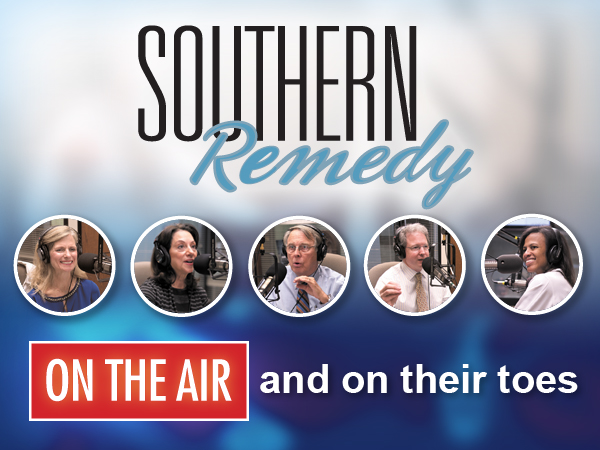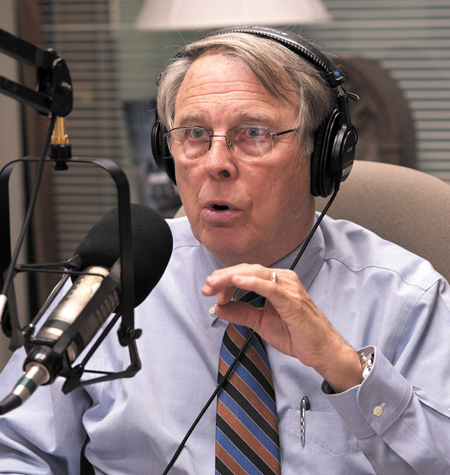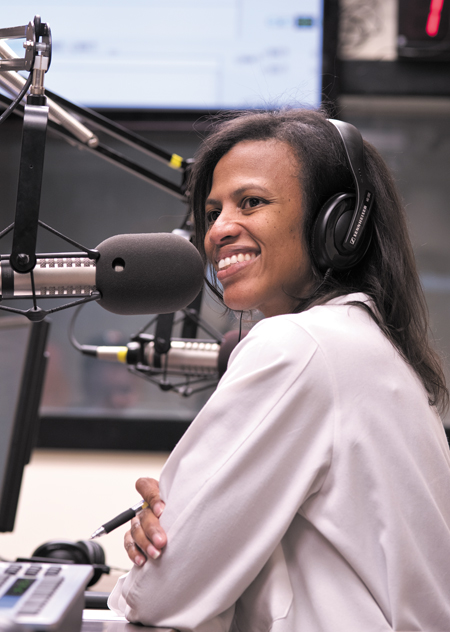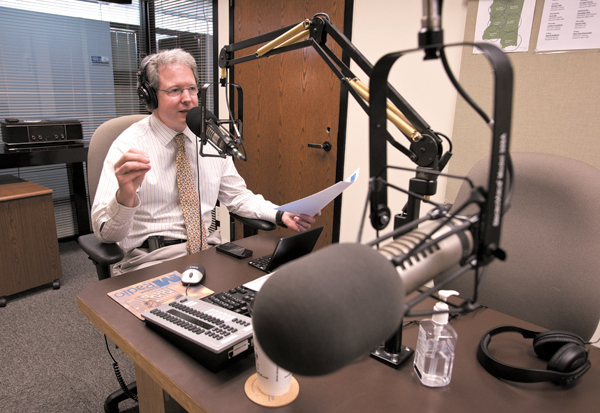UMMC health experts entertain, inform daily on Southern Remedy

If there's a remedy for what ails you, Dr. Rick deShazo will prepare a good-sized dose every Wednesday - but not before he delivers a primer on your health dilemma.
So will Dr. Jimmy Stewart on Thursdays and Dr. Michelle Owens on Fridays. Add to the mix Dr. Susan Buttross on Tuesdays and Dr. Debbie Minor on Mondays.

Led by deShazo, the University of Mississippi Medical Center's Billy S. Guyton Distinguished Professor and professor of medicine and pediatrics, the five experts offer fresh, frank and sometimes funny discussions on current health topics every weekday on Mississippi Public Broadcasting's “Southern Remedy,” the station's flagship wellness program.
You can hear them on MPB Think Radio from 11 a.m.-noon.
“We focus on health literacy and individual needs,” said deShazo, the original “Southern Remedy” radio host dating back to 2004. “We do have a general topic for each show, but it's not a talk show. We let the audience drive it.
“That's the key. We want to meet their needs, not our own needs.”
Judging from the number and variety of callers - most from Mississippi, but a good smattering from surrounding states - that's exactly what happens.
“Hello, Mississippi! Welcome to 'Southern Remedy!'” deShazo said into the microphone on a recent Wednesday after the show's folksy theme song faded at the stroke of 11. “It's open mic! It's all about you, so get your questions ready. Give us a call, and you will be heard.”
“Southern Remedy's” all-star lineup is anchored by deShazo, who covers “General Health,” a topic so broad that deShazo knows to expect the unexpected.
“I remember one caller telling me, 'Dr. Rick, it sounds like you've had every disease you can have, including women's diseases,'” he said.

Minor, professor and vice chair of the Department of Medicine, presents “Healthy and Fit.”
“The show is so much fun because I can go all over the place,” said Minor, a pharmacist by training. “I cover health promotion, health maintenance and disease prevention.
“We've explored what you do when life throws you a curveball that you can't do anything about. How can you be healthiest in that setting?”
Buttross, professor of pediatrics and chief of the Division of Child Development and Behavioral Pediatrics, uses her broad expertise to explore child and family relationships during “Relatively Speaking.”
“We discuss anything from children with autism or ADHD or dyslexia all the way up to blended families and divorce,” Buttross said. “We've had shows on hoarding and we talk about mood disorders. It's just anything that can affect the family and family relationships.”
Stewart, professor of internal medicine and pediatrics with a focus on hypertension, covers the sometimes tumultuous child and adolescent years in his “Kid and Teen Health” segment.
“Pediatrics is one of those areas that gets overlooked, and there are specific things in pediatrics that are handled a lot differently than in the adult population,” he said. “We get a lot of questions about medications that kids are taking for chronic conditions, and immunization is a hot topic - why we immunize, and the possible side effects.”
And Owens, associate professor of obstetrics and gynecology, calls on her passion for improving the health status of all Mississippians, especially women and girls, in “Women's Health.”

“We give women's perspectives on issues that might affect them, such as gynecological or obstetrical women's health,” Owens said. “But our show isn't just that. Women also have heart disease and hypertension and diabetes.”
“We can address women's health from a broader sense.”
In the short time since the weekday program began, Owens' segment has vaulted to become MPB's top-rated show, with Stewart's show jumping to No. 2.
Although “Southern Remedy” can be enjoyable for hosts and audience alike, it's dead serious when it comes to creating a healthier Mississippi.
“We do it to be of service and to increase health literacy, because we see so much suffering in this state,” deShazo said.
deShazo and the other hosts generally choose an opening topic and often pair it with a guest expert, but the callers are king when it comes to the questions.
“Our most repetitive question is about toenail fungus,” deShazo said. “We get a lot of coded questions about sex. They won't come out and tell us they have a sex question, or an STD. We have to read between the lines.”
“One of our broader topics that's really popular is feet,” Owens said. “We get tons of calls during that show, and a lot will come from men. They'll say, 'I know this is a woman's show, but can you take my call?'
“Our show is labeled 'Southern Remedy for Women,' but we've found that our listening audience encompasses both women and men. So, we say it's the show for women and the people that love them.”
Sometimes, Minor said, she'll do a little re-directing when a caller is way off topic.
“My little granddaughter is starting to develop underarm odor. What should I do?” she recalled a listener asking. She referred that caller to Stewart's program.
“I try to stay on topic, but half the time we don't get to half of what I planned to talk about,” Minor said.
Their studio at MPB headquarters, located on the grounds of the Education and Research Center in Jackson, is cozy. A table is lined with microphones, and a large electronic board on a wall displays the first names of callers, their city, and a few words about the nature of their problem.
It wasn't always a multi-doctor lineup. The decision was made in August 2014 to expand to five days a week, an idea proposed by Jason Klein, MPB's director of radio.
“It was a moment of deciding if I should come up with a new show, or expand a current show,” Klein said. “I thought the one that had the most potential was 'Southern Remedy,' and the one that would add the most to our mission was 'Southern Remedy.' I had to pitch it to everyone here and to UMMC, and I had to choose a producer. That was Jay (White), my best and most experienced producer.”
At the time, Buttross was hosting “Relatively Speaking” every Monday. Her show was wrapped into the expanded 'Southern Remedy,” and “we were just blessed to have a real good group of people as hosts,” deShazo said.

He's part of the weekly lineup, Stewart said, in part because “Dr. deShazo twisted my arm.
“When he started the original show, I'd come on several times as a guest. He asked me about being on the show when they started to diversify it. I thought it would be a good opportunity to reach out to the community and the state on topics people would be interested in.”
“To my knowledge, there is no other public broadcasting network that tackles health issues like this, or gives the public access to real advice from doctors on a daily basis,” White said.
On a recent show, deShazo invited Dr. Ross Thurmond, an internist and chief resident, to be his guest. Their topic: the Zika virus, a mosquito-borne disease linked to severe brain damage in babies of women who were pregnant when bitten, or who became pregnant soon after.
“That's the great thing,” deShazo said. “We can bring on specialists for anything that's hot.”
The hosts say their blend of chemistry, respect for each other and individual approach to health problems is good for listeners. That's not to say their philosophies always match.
“We disagree on lots of things,” Minor said of her rapport with deShazo. “That's why we love and respect each other so much.”
They're also each other's cheerleaders.
“We don't usually get to hear each other's shows, but Susan might send me a message to say she got to hear my show the other day, and that I did a great job,” Owens said. “To have someone seasoned offer encouragement and give me positive feedback is really meaningful.”
The hosts say their purpose is to genuinely help those who call in, and those who tune in.
“We've had incredible response, and a huge stream of emails and thank-yous,” deShazo said. “We've had a lot of people get health screenings and do a better job on their prescriptions because of the show.”
“There are so many brave listeners who have called in and made our show better by sharing their experiences,” Owens said, including women who are victims of domestic violence. “They really open up about something that was a horrible experience. They say to other people that there's life after domestic violence, and that you can be happy again.”
Try as they might, sometimes they feel like they've failed a caller.

“We were talking about loss on one show, and a sweet gentleman called in,” Buttross said. “He had lost his wife and was very sad, even though she died several years ago. I started giving him ways he could deal with his grief, including thinking about the positive times.
“He said that wouldn't really work for him. I told him that sometimes, just talking to other individuals about a loss really makes a difference. He said that wouldn't work.
“I talked to him about counseling. He'd already done that. I said that maybe he could journal his thoughts and feelings, and that sometimes getting it out of your mind and body is helpful. He told me that wouldn't work, either.
“I finally told him, 'Sir, I am sorry for your loss.' I could only hope that his talking about his feelings was helpful. Sometimes, just getting your thoughts out is therapeutic.”
But broadly speaking, deShazo said, the hosts have a tremendous impact.
“Our listenership of 'Southern Remedy' has increased tenfold,” Klein said. “What the hosts have done is given life to their individual topics.”
To listen live to “Southern Remedy,” visit www.mpbonline.org/programs/radio/listen-live/.
Southern Remedy: On the air and on their toes
Dr. Rick deShazo remembers callers who, rather than a question, had a health emergency in progress.And Dr. Susan Buttross remembers the time that a caller suggested handling a problem not by peaceful means, but with a pounding.
All of the hosts of “Southern Remedy” remember those infamous calls from listeners that were funny, freaky, surprising, sad or just plain unexpected.
A few of their recollections:
Dr. Debbie Minor, Monday's “Healthy and Fit”
“One time when Dr. Mary Currier (Mississippi state health officer) was on the show with me, we were talking about vaccinations. A man called in from the coast and said, 'You're telling me I have to have my grandchild vaccinated. I don't know why anybody should be telling me that I have to have my grandchild vaccinated before he goes to school.'
“Mary and I just looked at each other like, 'You have got to be kidding.' There's a whole lot of looking at each other when the show is going on. Sometimes it's a reflection over a response, and lots of times it's because our hearts just go out to our callers and their issues.”
Dr. Susan Buttross, Tuesday's “Relatively Speaking”
“Once when we were discussing bullying, I was talking about what parents and children should do, and that children need to have a plan to ignore the bully. I said that not getting a reaction from the bully is very important, and that parents should teach their children to let the other kids know they're not afraid.
“Someone called in and said, 'I think you're all wrong. I think you need to teach him to whip his ---.' That's probably not the advice that you'd want to give. Getting into a fist fight is last on the list.”
Dr. Rick deShazo, Wednesday's “General Health”
“The most frightening is when people call us and tell us they are having chest pains that are traveling up their arm. They're having a heart attack!”
Dr. Jimmy Stewart, Thursday's “Kid and Teen Health”
“I had the strangest idea to do a Father's Day program about the influence that fathers have on their children, or that father figures have on children. We had callers that were pretty emotional. They talked about their dad as a positive influence in their life, or how it was to not have a dad, or to have a dad who was abusive. We had a lot of input on both sides of the issue.”
Dr. Michelle Owens, Friday's “Women's Health”
“It was a Valentine's Day show, and we were talking about people having difficulty with intimacy and having sexual issues. I'd wanted to do this show and had looked through women's health magazines to see what people were reading in the grocery store lines. So many people were calling in that day.
“But at the very end of the show, a lady called in. She said that she was 72 and had been married to her husband for so many years, and she said, 'We just seem to do it all the time. Is there such a thing as too much sex?'
“We were all dumfounded. We cracked up laughing because she was so sincere. I told her, 'Look, as long as you're enjoying it, you are fine, and you have probably made a whole lot of women jealous right now.'”


